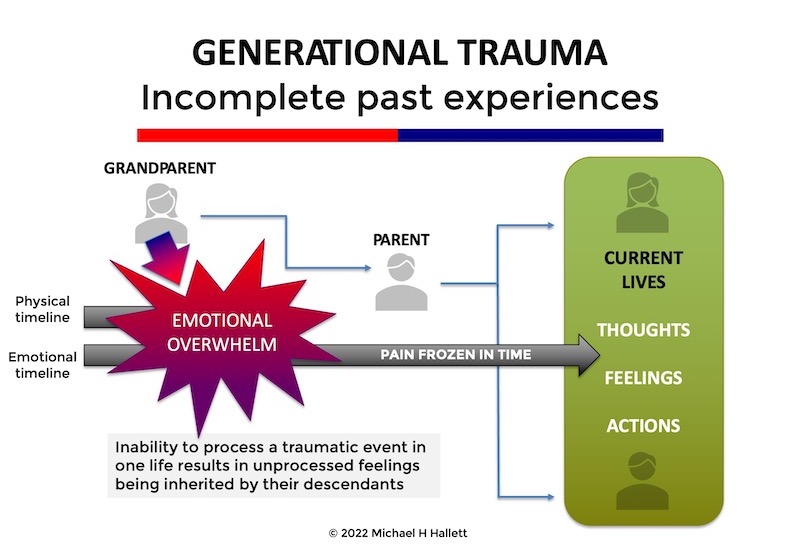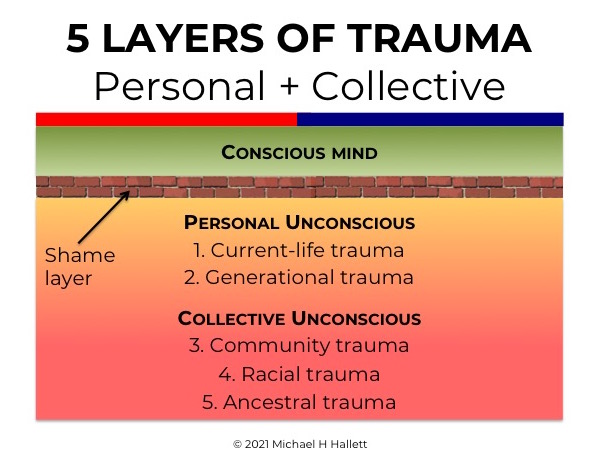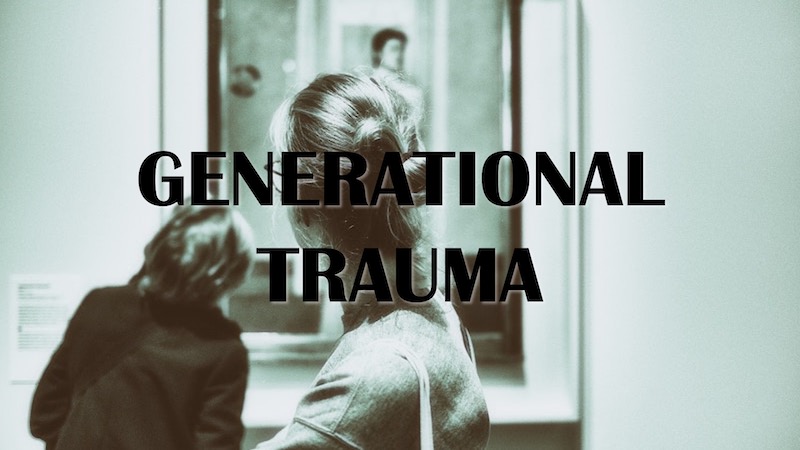What is generational trauma?
- 26 October 2018
- Posted by: Michael H Hallett
- Category: Cornerstones , Generational trauma ,

Generational trauma is unresolved trauma and shame genetically inherited from your mother or father through epigenetic inheritance. It surfaces as disempowering feelings and behaviours that make no sense in the context of the life of the person experiencing them.
Generational trauma is unresolved trauma and shame genetically inherited from your parents through epigenetic inheritance.
What is generational trauma?
All inherited trauma can be described as generational trauma or even ‘family trauma’ as we inherit it from our parents. Yet not all of this comes from events that directly happened to them.
Here I use the term ‘generational trauma’ to describe traumatic events that happened to the most recent 2 to 4 generations of our families. Events like divorces, sex scandals, financial failures, or war experiences that were too traumatic to handle. We experience the shame and pain of these events as if they happened to us.

At the 2021 Intergenerational Trauma Conference, Peter McBride, Director of the Cohen Center for Holocaust and Genocide Studies, noted that inherited traumas are not memories. The sufferer “holds on to the experience as a living experience”.
Generational trauma was first identified in the 1960s through Canadian studies of psychological illnesses among the children of Holocaust survivors. Speaking at ITC 2021, Peter Levine noted that some children reported smelling burning flesh.
Generational trauma is also known as intergenerational trauma or trans-generational trauma.
Sources of generational trauma
Anything traumatic or shameful is a potential source of generational trauma, including (but not limited to):
- Abuse (physical, emotional or sexual)
- Sexual impropriety
- Financial/social scandals
- Abandonment
- Unexpressed grief
- Wartime ‘shell shock’
- Neglect
Generational trauma can also surface as patterns of destructive behaviour, e.g. a family that has recurring marriage breakdowns due to infidelity over multiple generations. The invisible nature of the underlying condition, with cause and effect spread over generations, makes it difficult to identify and resolve.
Peter McBride notes that attribution—linking current issues with past ones—is more difficult “the further away we move from the direct experience.”
Epigenetic inheritance
Generational trauma replicates through a mechanism known as epigenetic inheritance. It’s effectively an inherited form of Post-Traumatic Stress Disorder (PTSD).
Laboratory tests have demonstrated epigenetic inheritance. Mice were given ample food and behaved normally. The food was then reduced to a minimum and the mice became aggressive and anxious.
The food supply was then reinstated. The mice’s aggressive behaviour did not change. A new generation of mice was bred from these aggressive mice. The offspring were given unlimited food from birth, yet retained their parents’ aggressive conditioning.
Professor Rachel Yehuda, speaking at ITC 2021, explained that “environmental influences cause chemical reactions that can interfere with how DNA is transcribed.”
‘Generational sin’
While the understanding of the mechanics of epigenetic inheritance is fairly recent, generational trauma goes way back. The Christian church refers to it as ‘generational sin’ or ‘generational curses’. The Bible refers to it on several occasions (e.g. Exodus 20:4-6, Jeremiah 31:29 and John 9:1-3).
Deuteronomy 23:2 is an example of intergenerational shaming for sexual impropriety: “No one born outside a legal marriage, or any of their descendants for ten generations, can fully belong to the Lord’s people.”
Biblical shaming of sexual behaviour has cascaded shame from one generation to the next. “I tell you not to divorce your wife unless she has committed some terrible sexual sin.” (Matthew 5:32)
Cannot process
Generational trauma occurs with a traumatic event that the person experiencing it cannot process. I’ve written about this in more detail in The mechanics of emotional pain. Any accumulation or backlog of experience too painful to process—i.e. fully feel—and release as it happens creates trauma.
At ITC 2021, Peter McBride noted how trauma destroys our “assumptive world” of safety. This is the assumption that we live in a safe world. When an event transcends our ability to process it, this assumptive world shatters. If we cannot reassemble that world, our descendants inherit the task—even if it takes thousands of years.
Traumatised animals systematically shake their bodies to release the trauma. Humans go into shock, denial and emotional shutdown. The unresolved trauma embeds in their DNA. Their children inherit it in diluted form.
Forms of trauma
Here it becomes part of the child’s unconscious. This is a pool of traumas from their current life as well as inherited trauma from several sources. I’ve written more about this in Trauma exists as a series of ripples.

- Current-life trauma—trauma from events in our current lifetime
- Generational trauma—trauma inherited from our immediate ancestors, typically from unresolved events that occurred to our parents and grandparents
- Community trauma—trauma that affects an entire, specific community
- Racial trauma—trauma that affects an entire, specific race
- Ancestral trauma—trauma inherited from remote ancestors, up to several thousand years old, that affects everyone living in patriarchal societies
Ultimately, all traumas are downstream from the core separation at the heart of our being, the mother wound.
This affects children in a similar way to PTSD, despite having no direct experience of the traumatic event. Because of the disconnection between the source of the trauma in one generation and its expression in a later generation, generational trauma is hard to identify.
Highly Sensitive Persons
Another factor affecting our susceptibility to trauma is sensitivity. Elaine N. Aron, PhD, has extensively studied human sensitivity. Her research is documented in The Highly Sensitive Person. She writes:
One in every five people is born with a heightened sensitivity; they are often gifted with great intelligence, intuition and imagination, but there are also drawbacks. Frequently they come across as aloof, shy or moody and suffer from low self-esteem because they find it hard to express themselves in a society dominated by excess and stress.
HSPs have a heightened awareness of society’s unspoken rules and of how their feelings violate those rules. The result is all the symptoms catalogued by Aron: aloof, shy, moody, low self-esteem, and a struggle for self-expression.
The more sensitive you are, the more your unconscious rules your life—and the more family traumas will affect you.
Arrested development
Generational trauma may take a relatively low-grade form or it can have a very significant impact. This can result in instances of arrested development (also known as ‘developmental disorder’), where crucial developmental tasks in the child’s life don’t unfold correctly.
The Medical Dictionary defines ‘developmental tasks’ as:
Fundamental achievements that must be accomplished at each stage of life, arising at or near critical stages in the maturation of an individual; successful attainment leads to a healthy self-image and success with later tasks. Failure to achieve developmental tasks at one stage leads to unhappiness in the individual, disapproval of society, and difficulty in accomplishing later developmental tasks.
This happened in my own case when my grandmother had an affair in 1932. The family evicted her. Her mother’s preference for an affair to raising her daughter deeply traumatised my mother. My mother was unable to process the double-whammy of abandonment and sexual shame. This emotionally crippled her for life.
I inherited her unprocessed feelings and had to process them as part of my own healing journey. This also significantly affected my mother-child development process right from birth. This affected my ability to communicate, connect with others, and to nurture both myself and other aspects of my life (e.g. family, career, creations).
Further reading
In The emotional cost of generational trauma I go into greater depth about its impact.
Suzannah Lessard’s The Architect of Desire is a classic study of generational trauma. Lessard’s great-grandfather Stanford White was a leading architect during the American ‘gilded age’ of the late 19th century. He was also a serial sexual abuser whose murder caused a national scandal.
Stanford White’s sexually motivated murder cascaded shame and sexual abuse across several generations of Lessard’s family, a trauma that she unpicks in her harrowing and courageous account.
Paula Uruburu’s American Eve – Evelyn Nesbit, Stanford White and the birth of the ‘it’ girl tells the story from the perspective of Evelyn Nesbit, the beautiful young ingénue at the heart of the Stanford White scandal.
Healing generational trauma
How do you identify family skeletons, i.e. generational trauma, in your family?
Your family tree is the obvious place to start—as are the emotional symptoms you’re observing, in your life or those of family members, which make you question if you’re dealing with generational trauma.
A lot of this is basic genealogical research advice—with one significant exception. The information you seek is often noticeable only by its absence.
Speaking about racial trauma at ITC 2021, Professor Kenneth V. Hardy observed that “we have to change what we look for in order to change what we see”. This applies to all forms of inherited trauma.
You’re looking for ‘skeletons in closets’. Sex scandals, financial ruin, sudden deaths, illegitimate children—all the things the chroniclers of your family didn’t want to record for posterity. In her family memoir The Scarlet Sisters, Helen Batten notes that “the number of wedding photos that survive are in direct proportion to how popular the marriages were with the family.”
Like a detective at a murder scene, you’re looking for disturbances in the ‘loam’ of your family history. And, as they say, the dead don’t talk.
Next steps
For further resources on generational trauma, both free and paid, please click on this image.
Photo by OC Gonzalez on Unsplash

